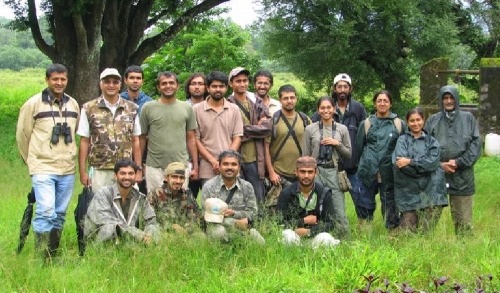Against the tide: NCBS's wildlife students
Every August finds the NCBS campus brightened by its new students, and particularly so each second summer with the arrival of a small but particularly committed cohort - the fifteen enrollees of the Masters Course in Wildlife Biology and Conservation. The fourth batch, who will be the graduates of 2012, are being selected right now, to emerge as the success stories of a tough filtering process that sifts through about 400 candidates each time. And the difficulty of the process lies not just in the number of applicants but in their quality. Many of the wildlife students are giving up already successful careers as doctors, vets and engineers to switch to a profession where the promise of substantial financial reward can never be mistaken as a major lure.
In making what many, including some of their parents, would see as an unusual life-choice, the students are actually well ahead of the curve. Because, while many in India recognise that its wild places and creatures are under threat, the students are also able to take the big step of doing something about it, even if this means a life less cosy.
That India has a significant but precarious wild heritage in urgent need of management is incontrovertible. In terms of biodiversity India is more blessed than most, and is recognised by the UN as one of seventeen “megadiverse” countries. Despite only covering 2.3% of the earth's land surface, India houses 7.6% of the world's animal species, 12.6% of its birds and 6% of its plants. Indian wildlife faces the same main threat faced by wildlife around the world: habitat loss. Between 2002-2008 India's population growth was 136% of the world average, and the UN estimates that India will overtake China around 2025. Over the next five years India's GDP is predicted to grow at a rate of 200-300% of the world average. Therefore it is not surprising that India in 2009 had 440 and 247 of its animal and plant species, respectively, listed in the top three categories of vulnerability by the International Union for the Conservation of Nature. In the future, habitat loss, even if it continues merely at a constant rate, is likely to cause an acceleration of species loss and depletion.
Although there is so much endangered wildlife to protect, India is ill-equipped to do so. “Despite substantial resource commitments by the Indian government, NGOs and international agencies, the conservation of India’s biodiversity has been severely handicapped by the lack of trained wildlife scientists who can design, implement and monitor conservation projects”, says Ajith Kumar, the course Director. Before the NCBS-based course was initiated, the only other place offering similar training was the Wildlife Institute of India in Dehra Dun. Traditional university courses in biology do not properly prepare wildlife scientists who need additional expertise in areas such as advocacy, negotiation, conflict resolution, law and policy.
Recognizing this, a group of reputed biological research institutions came together in 2004 to start the current program. NCBS provided the infrastructural facilities, and also served as a source of expertise in areas such as molecular biology and, latterly, ecology, remote sensing and GIS. The Centre of Wildlife Studies (CWS), Bangalore, well known for research on large carnivores, raised funds for an initial period of six years from Wildlife Conservation Society, New York, to cover operating costs and coordinated the academic program. With a guest faculty consisting of academicians and practitioners from institutions in India and worldwide, the course is designed to offer a cutting-edge and flexible program in a cost effective manner. The degree itself is now awarded by the Tata Institute of Fundamental Research (TIFR), Mumbai.
As well as navigating an intensely rigorous course-work component, the students undergo extensive field training in many parts of India, covering about 30 days in each semester. In the fourth and final semester of the course each student is required to carry out a research project, ideally of conservation relevance, and to submit a dissertation in the form of a manuscript for publication in a peer-reviewed journal.
The first two batches of 15 students drawn from 12 states, graduated in 2006 and 2008, and have been an unqualified success. Their research projects have, for example, led to better ways to detect wild tigers, leopards and hyenas (using fecal DNA and automated photographic capture), they have shown how the wild fauna of coffee plantations interacts with that of adjacent protected areas, and they have demonstrated that excess lighting can lead to the disorientation and death of olive ridley turtle hatchlings on the east coast beaches.
As of December 2009, 21 research papers from 30 dissertations have been published in peer-reviewed journals, and more are in the pipeline. Students of the first two batches presented their research findings in 22 international seminars and symposia, winning various young scientist prizes. Thirteen graduates have already begun their Ph.D. program in India, the USA and Europe and the others are working with research and conservation organizations, their activities spanning more than ten states in India. At NCBS there are long-term plans to expand the size and outreach of the program, by providing Masters and higher level courses that would address conservation issues affecting the wider South Asian region.
The Wildlife programs at NCBS and the Wildlife Institute have been a good start along a long road. We can only hope that as the threat to India's wild heritage accelerates, so does the sense of commitment of India's youth to address it.


Comments
Lets all encourage the
i m in my first year m.sc
Please see response to
Please tell me how to prepare
Dear Akhil, Thanks for the
Hi divya, i have some query
Hi Akhil I will pass your
Its a fact that conservation
i have cleared the entrance
Post new comment